A mezuzah is a small case attached to the doorpost of your home, holding sacred verses that reaffirm your connection to God. It symbolizes your commitment to Jewish traditions while serving as a protective charm against harm. As you pass through, touching and kissing the mezuzah is a common practice that strengthens this bond. Discovering more about its significance and customs can enhance your understanding of this cherished Jewish symbol.
Key Takeaways
- A mezuzah is a small case containing parchment with scriptural verses, marking a home as observant of Jewish laws.
- The inscribed verses, including the Shema, emphasize God’s unity and serve as a reminder of the covenant with Him.
- Traditionally placed on the right doorpost, it symbolizes spiritual protection and connection to Jewish identity.
- Many believe the mezuzah acts as a protective charm, guarding against harm for those within the home.
- Touching and kissing the mezuzah reinforces its significance, fostering a sense of safety and community among residents.
Definition and Purpose of Mezuzah

A mezuzah, which means “doorpost” in Biblical Hebrew, represents more than just a decorative item; it signifies that a home follows Jewish traditions and beliefs. This small case typically holds a rolled parchment and serves as a powerful symbol of Jewish identity.
Placing it on the right doorpost upon entering a home marks it as a dwelling that adheres to Jewish laws. Historically, the mezuzah has been an external marker for Jewish households for thousands of years, reminding you of your covenant with God and educating you on His commandments.
It unites Jewish communities worldwide, creating a sense of belonging and continuity, while also serving as a visible reminder of your faith and heritage.
Scriptural Verses Inscribed

The mezuzah prominently features scriptural verses that encapsulate core Jewish beliefs, primarily the Shema Yisrael. This declaration of faith, beginning with “Hear, O Israel, the Lord our God, the Lord is one,” emphasizes God’s unity and love.
You’ll find references to inscribing these verses in Deuteronomy 6:9 and 11:20, highlighting the importance of teaching children about these commandments. Traditionally, the mezuzah includes the full Shema passage from Deuteronomy 6:4-9 and 11:13-21.
Not only does this serve as a constant reminder of your commitment to God, but it also reinforces your connection to Jewish heritage. By placing these verses on your doorposts, you’re marking your home as a sacred space under divine protection.
Case and Materials of the Mezuzah
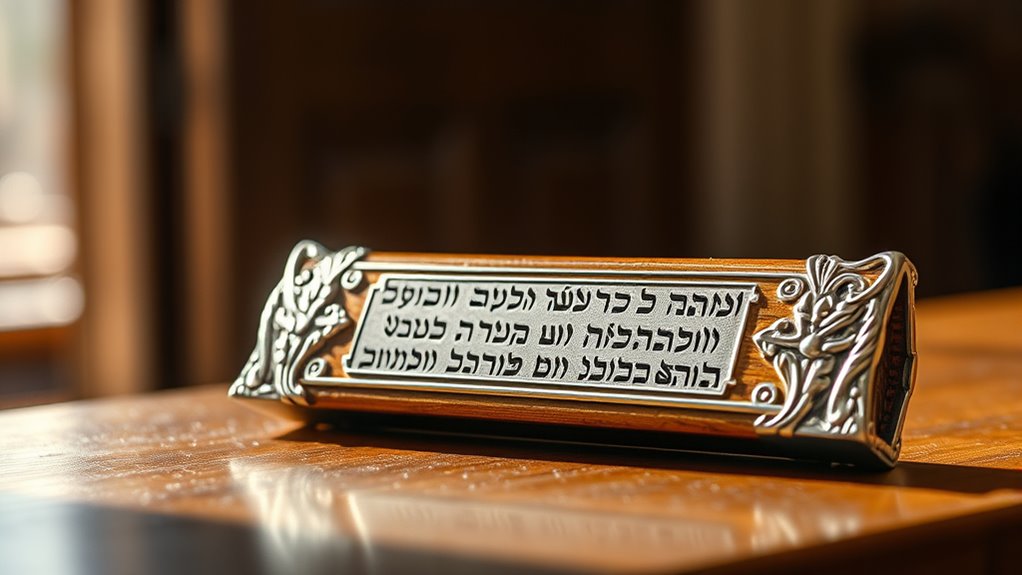
When choosing a mezuzah, you’ll find a variety of cases made from materials like metal, wood, ceramic, and plastic, each offering its own unique appeal.
Silver cases exude a classic charm, while ceramic options bring modern flair with vibrant colors. Wood cases range from traditional to contemporary styles, and glass cases can even serve as keepsakes.
Many mezuzah cases feature traditional symbols, like the shin (ש), enhancing their significance. Some are designed to withstand outdoor elements, ensuring durability.
You also have the freedom to customize your mezuzah with materials like clay or wood, reflecting your personal taste.
With options available for every budget, you can find a mezuzah case that suits your style and needs perfectly.
Traditional Practices Surrounding Mezuzah
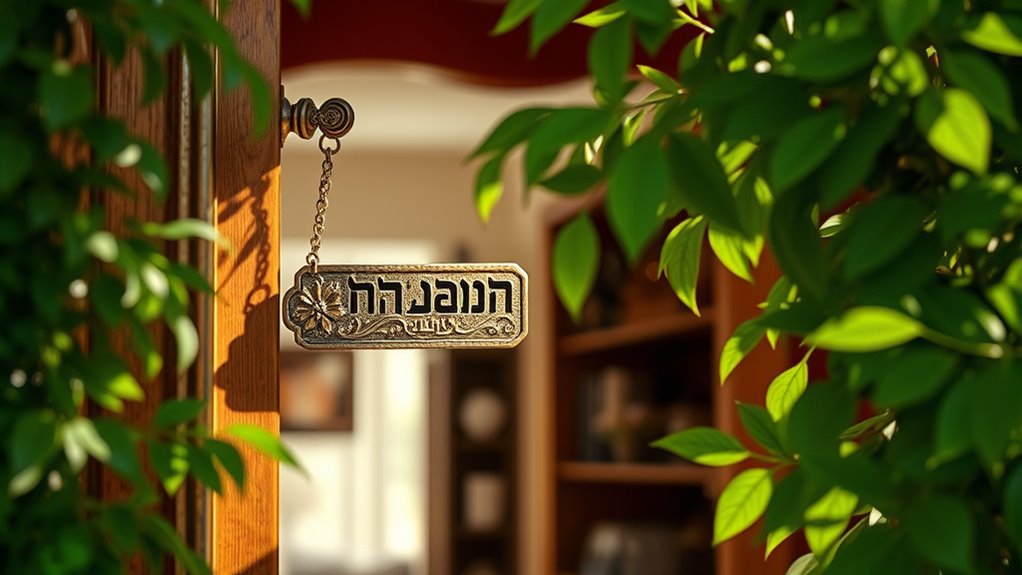
While many may view the mezuzah as just a decorative item, its installation and handling are steeped in tradition and significance.
In Ashkenazic practice, you’ll place the mezuzah at a slight angle, while in Sephardic communities, it’s affixed vertically. Typically, you install it on the right-hand doorpost, serving as a reminder of Jewish law.
When passing through, it’s customary to touch and kiss the mezuzah, reinforcing its spiritual importance. Some even recite a blessing upon installation or when touching it, creating a daily affirmation of faith.
The mezuzah also sparks conversations among visitors, representing a visible expression of your Jewish identity and encouraging engagement with community practices and discussions.
Protection and Significance of Mezuzah
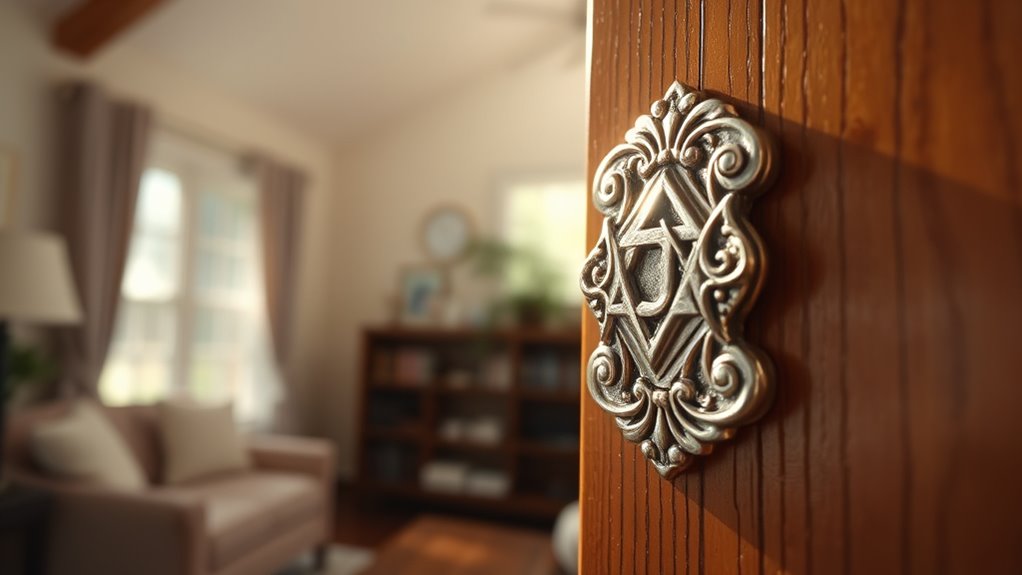
Mezuzahs are more than just decorative items; they embody a profound significance and serve as a protective charm for your home.
Believed to guard against harm, the mezuzah acts as a barrier, offering spiritual and physical protection to you and your loved ones. This protection stems from fulfilling the mitzvah of affixing a mezuzah, a practice supported by Kabbalistic teachings and widely accepted within the Jewish community.
It symbolizes a loving relationship with God, reminding you of divine commandments. Many find psychological comfort in its presence, fostering a sense of safety and community.
Cultural and Historical Context
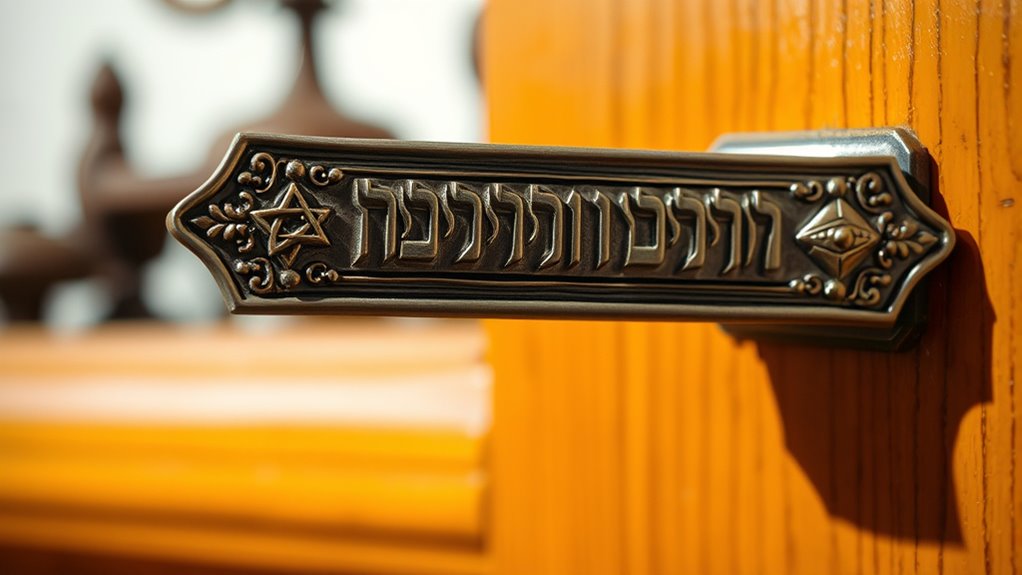
Understanding the cultural and historical context of the mezuzah reveals its significance beyond mere decoration. It marks your home as a Jewish household, reflecting adherence to Jewish laws and rituals.
The term “mezuzah,” meaning “doorpost” in Hebrew, highlights its placement on doorframes, connecting Jews worldwide. This practice dates back to the Second Temple era, demonstrating resilience despite adversities like Roman occupation.
The earliest mention of marking doorposts comes from Exodus, where Jewish homes were protected during the plague. Over time, the mezuzah evolved from direct inscriptions to parchment enclosed in a case.
The Symbolism of Mezuzah in Judaism
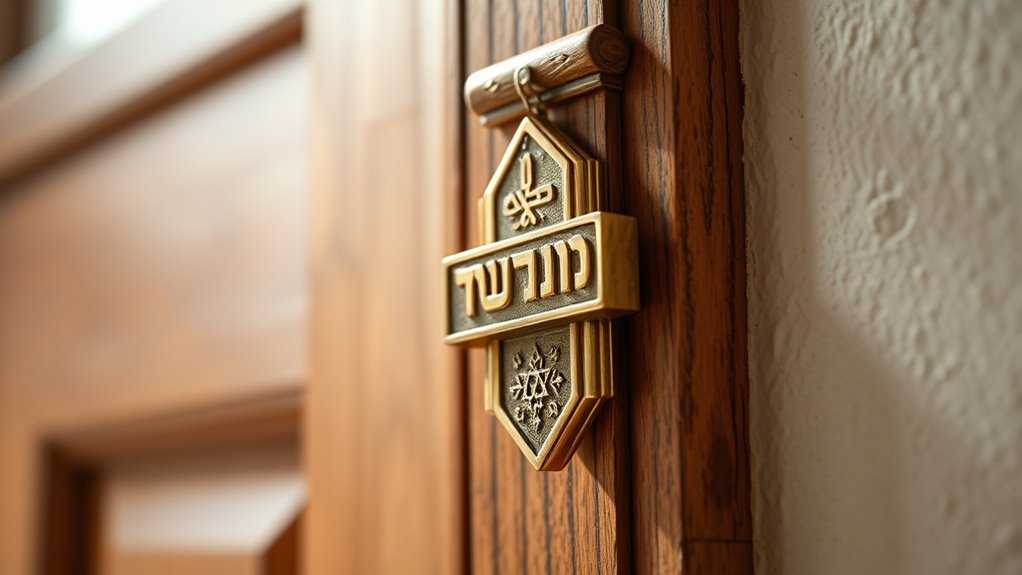
The mezuzah carries profound symbolism in Judaism, representing a deep connection between G-d and the Jewish people. It symbolizes G-d’s eternal love for Israel and serves as a daily reminder of your commitment to faith and identity.
As a sign of the Covenant, the mezuzah reinforces your bond with G-d and prompts you to resist negative impulses. Often viewed as a protective guardian, it offers spiritual defense and serves as a continuous reminder of virtue.
The scriptural foundation emphasizes loyalty and devotion, while the decorative elements reflect Jewish culture. Ultimately, the mezuzah stands as a public declaration of your faith, connecting you to the broader Jewish community and enriching your home with spiritual significance.
Mezuzah Placement and Orientation
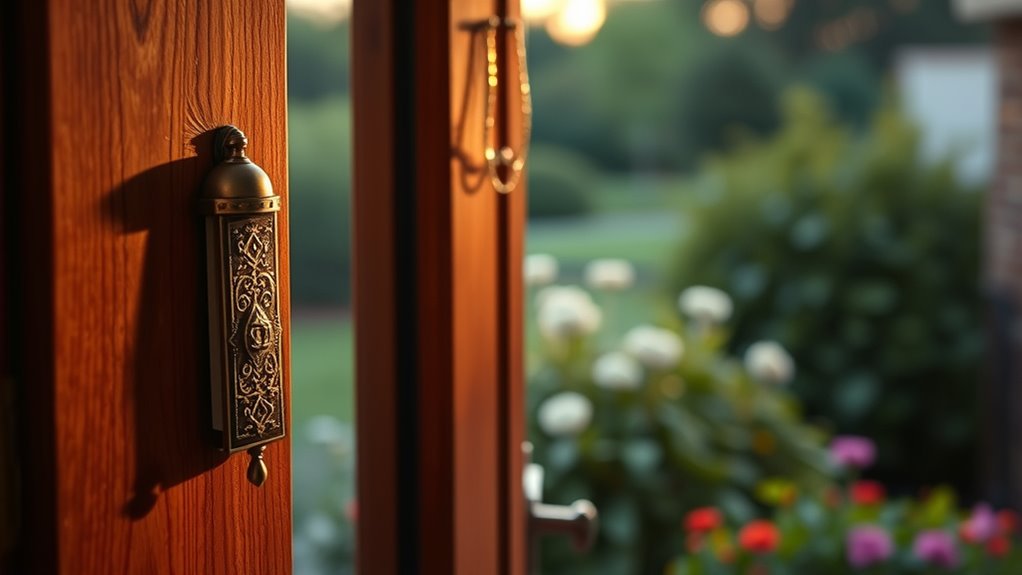
Placement and orientation of a mezuzah are vital aspects of this sacred tradition, ensuring its spiritual significance is upheld in every home.
You should affix the mezuzah on the right side of doorposts as you enter each room, excluding bathrooms and small closets. For double doors, one mezuzah suffices unless they function separately.
Traditionally, Ashkenazim place the mezuzah at a slant, tilting the top toward the room’s interior, while Sephardim position it vertically. In narrow spaces, you can attach it straight up.
Securely affixing the mezuzah is vital to prevent it from falling. This practice honors Talmudic debates, reflecting unity within the Jewish community and respecting various rabbinical viewpoints throughout history.
The Role of Mezuzah in Home Sanctification

A mezuzah plays an essential role in sanctifying your home, serving as a tangible reminder of faith and divine presence. Based on Deuteronomy 6:9 and 11:20, it marks your doorposts, transforming your space into a sacred area.
Kabbalistically, it acts as a protective barrier against evil forces, reinforcing the belief that God is the true owner who guards and protects your household. By affixing a mezuzah, you invoke divine blessings and emphasize your commitment to Jewish law and tradition.
Regularly checking its kashrut guarantees it remains effective, while the act of affixing it signifies the separation of the private domain from the public. This ritual enriches your spiritual life and connects you to centuries of heritage.
Frequently Asked Questions
Can a Mezuzah Be Installed on a Non-Jewish Home?
You can technically install a mezuzah on a non-Jewish home, but it’s generally discouraged.
The mezuzah is deeply rooted in Jewish tradition and symbolizes a covenant with God, which may not align with non-Jewish beliefs.
While appreciating Jewish customs is fine, displaying a mezuzah could be seen as misappropriating its significance.
It’s best to respect the traditions and meanings behind the mezuzah and consider alternative ways to honor spiritual practices.
What Happens if the Mezuzah Gets Damaged?
What if your mezuzah gets damaged?
You might be surprised to learn that a damaged mezuzah can lessen its spiritual protection. It’s vital to inspect it regularly; if it’s illegible or written incorrectly, you’ll need to replace it.
Neglecting this can expose your home to potential spiritual harm.
Are There Specific Prayers Associated With the Mezuzah?
Yes, there are specific prayers associated with the mezuzah.
Before you affix it to your doorpost, you’ll recite a blessing that thanks God for the commandments, including this one. This moment’s significant, as it connects you to your faith and the community.
You’ll also find that some people say prayers when they pass by the mezuzah, reinforcing its role as a reminder of God’s presence and protection in your home.
How Often Should Mezuzahs Be Checked for Validity?
You should check your mezuzahs twice every seven years, which is about every 3.5 years for private ones.
Some folks prefer to inspect them annually, especially during the Hebrew month of Elul, to guarantee everything’s in order.
If adverse weather or physical damage occurs, more frequent checks are wise.
Public mezuzahs typically get inspected once every 25 years, but private ones require closer attention to maintain their validity.
Can Children Participate in Affixing a Mezuzah?
Absolutely, you can involve children in affixing a mezuzah! It’s a great way to teach them about Jewish traditions and values.
If a child understands its significance, they can help place it on their room’s doorpost. This participation not only fosters their connection to faith but also makes the ritual memorable.
Engaging children in such meaningful practices encourages their interest in Judaism and strengthens their sense of identity.
Conclusion
In conclusion, a mezuzah serves as a sacred symbol, safeguarding your space and spirit. It’s not just a decorative detail; it’s a divine declaration of faith, fostering a faithful framework for your home. By placing this powerful protector on your doorpost, you create a constant connection to your heritage and beliefs. So, embrace the mezuzah’s meaningful message, and let it illuminate your life with its rich rituals and revered reminders.









